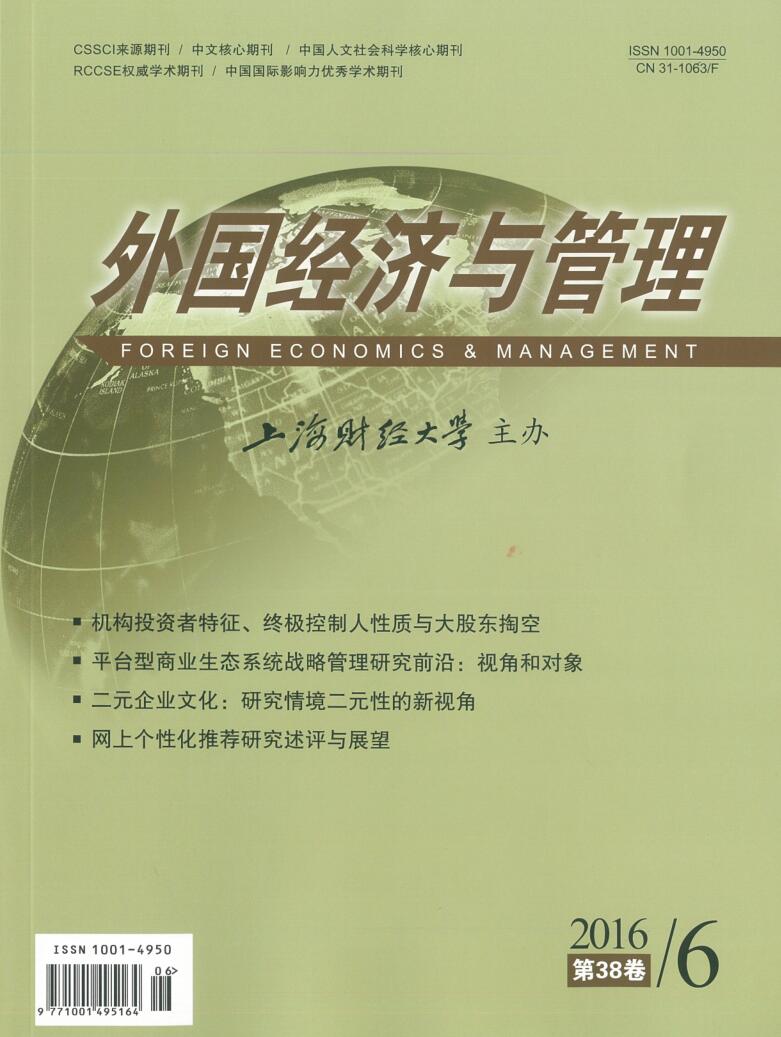大股东与小股东之间的利益冲突是随着现代企业的发展而产生并不断演化的。大股东利用控制权编织的关联网络进行非公平交易成为侵占中小股东利益的主要手段,也成为各界关注的焦点。本文从不同特征的机构投资者入手,研究了独立与非独立机构投资者、长期与短期机构投资者对大股东关联交易掏空行为的抑制作用,进而讨论了在终极控制人不同的国有企业和家族企业中机构投资者的作用是否不同。实证结果表明,只有与公司没有业务联系、受政府干预少的独立机构投资者和持股时间较长的机构投资者才能有效限制关联交易中大股东的掏空行为。而且,在体制内的国有企业中,机构投资者能有效减少大股东关联交易中的利益侵占,但是,在以血缘和亲缘等纽带关系维系的家族企业中,机构投资者却不能减少关联股东的掏空行为。本文突破了机构投资者的同质性假设,揭示了组织的体制属性会影响机构投资者作用的发挥,检验了在特定情境下政府治理与公司治理作用的相互关系。
机构投资者特征、终极控制人性质与大股东掏空-基于关联交易视角的研究
摘要
参考文献
1 蔡卫星, 高明华. 终极股东的所有权、控制权与利益侵占: 来自关联交易的证据[J].南方经济, 2010, (2): 28-41.
2 陈德球, 陈运森.政府治理、终极产权与公司投资同步性[J].管理评论, 2013, (1): 139-148.
3 贺建刚, 孙铮, 李增泉. 难以抑制的控股股东行为: 理论解释与案例分析[J].会计研究, 2010, (3): 20-27.
4 洪剑峭, 薛皓. 股权制衡对关联交易和关联销售的持续性影响[J].南开管理评论, 2008, (1): 24-30.
5 姜春海.从国有企业到家族企业--关于丹东市工矿设备制造厂的调查[J].管理世界, 2002, (10): 120-126, 138.
6 孔东民, 刘莎莎, 黎文靖, 等. 冷漠是理性的吗? 中小股东参与、公司治理与投资者保护[J].经济学(季刊), 2012, (1): 1-28
7 李增泉, 孙铮, 王志伟."掏空"与所有权安排-- 来自我国上市公司大股东资金占用的经验证据[J].会计研究, 2004, (12): 3-13.
8 刘浩, 唐松, 楼俊. 独立董事: 监督还是咨询? -- 银行背景独立董事对企业信贷融资影响研究[J].管理世界, 2012, (1): 141-156, 169.
9 刘志远, 花贵如. 政府控制、机构投资者持股与投资者权益保护[J].财经研究, 2009, (4): 119-130.
10 吕怀立, 李婉丽. 控股股东自利行为选择与上市公司股权制衡关系研究-- 基于股权结构的内外生双重属性[J].管理评论, 2010, (3): 19-28.
11 唐松莲, 袁春生. 监督或攫取: 机构投资者治理角色的识别研究-- 来自中国资本市场的经验证据[J].管理评论, 2010, (8): 19-29.
12 涂国前, 刘峰. 制衡股东性质与制衡效果-- 来自中国民营化上市公司的经验证据[J].管理世界, 2010, (11): 132-142.
13 王克敏, 姬美光, 李薇. 公司信息透明度与大股东资金占用研究[J].南开管理评论, 2009, (4): 83-91.
14 王琨, 肖星. 机构投资者持股与关联方占用的实证研究 [J].南开管理评论, 2005, (2): 27-33.
15 魏明海, 黄琼宇, 程敏英. 家族企业关联大股东的治理角色-- 基于关联交易的视角[J].管理世界, 2013, (3): 133-147, 171.
16 吴先聪, 刘星.机构投资者异质性与公司业绩[J].中国会计与财务研究, 2012, (3): 1-55.
17 姚明安, 孔莹.家族企业与国有企业代理成本的比较-- 来自中国上市公司的经验证据[J].汕头大学学报(人文社会科学版), 2009, (4): 74-79.
18 姚颐, 刘志远. 机构投资者具有监督作用吗? [J].金融研究, 2009, (6): 128-143.
19 张健, 刘斌, 吴先聪. 财务舞弊、家族控制与上市公司高管更替[J].管理工程学报, 2015, (2): 1-9.
20 郑国坚. 基于效率观和掏空观的关联交易与盈余质量关系研究[J].会计研究, 2009, (10): 68-76.
21 朱建安, 陈凌, 窦军生, 等.制度环境、家族涉入与企业行为-- 转型经济视角下的家族企业研究述评[J].山东社会科学, 2015, (2): 146-152.
22 Aggarwal R, Erel I, Ferreira M, et al. Does governance travel around the world? Evidence from institutional investors[J]. Journal of Financial Economics, 2011, 100(1): 154-181.
23 Bennett J A, Sias R W, Starks L T. Greener pastures and the impact of dynamic institutional preferences[J]. Review of Financial Studies, 2003, 16(4): 1203-1238.
24 Berkman H, Cole R A, Fu L J. Expropriation through loan guarantees to related parties: Evidence from China[J], Journal of Banking & Finance, 2009, 33(1): 141-156.
25 Bertrand M, Mehta P, Mullainathan S. Ferreting out tunneling: An application to Indian business groups[J].The Quarterly Journal of Economics , 2002,117(1), 121-148.
26 Bushee B J. The influence of institutional investors on myopic R &D investment behavior[J]. The Accounting Review, 1998, 73(3): 305-333.
27 Chen X, Harford J, Li K. Monitoring: Which institutions matter? [J]. Journal of Financial Economics, 2007, 86(2): 279-305.
28 Cheng C S. A, Huang H H, Li Y H, et al. Institutional monitoring through shareholder litigation[J]. Journal of Financial Economics, 2010, 95(3): 356-383.
29 Cheung Y L, Jing L H, Lu T, et al. Tunneling and propping up: An analysis of related party transactions by Chinese listed companies [J]. Pacific-Basin Finance Journal, 2009, 17(3): 372-393.
30 Cheung Y L, Rau P R, Stouraitis A. Tunneling, propping, and expropriation: Evidence from connected party transactions in Hong Kong[J]. Journal of Financial Economics, 2006, 82(2): 343-386.
31 Chuang W I, Lee B S. The informational role of institutional investors and financial analysts in the market[J]. Journal of Financial Markets, 2011, 14(3): 465-493.
32 Claessens S, Djankov S, Fan J P H, et al. Disentangling the incentive and entrenchment effects of large shareholdings[J]. Journal of Finance, 2002, 57(6): 2741-2771.
33 Coffee J C Jr. Liquidity versus control: The institutional investor as corporate monitor[J]. Columbia Law Review, 1991, 91(6): 1277-1368.
34 Demiralp I, D'Mello R, Schlingemann F P, et al. Are there monitoring benefits to institutional ownership? Evidence from seasoned equity offerings[J]. Journal of Corporate Finance, 2011, 17(5): 1340-1359.
35 Ferreira M A, Matos P. The colors of investors' money: The role of institutional investors around the world[J]. Journal of Financial Economics, 2008, 88(3): 499-533.
36 Gao L, Kling G. Corporate governance and tunneling: Empirical evidence from China[J]. Pacific-Basin Finance Journal, 2008, 16(5):591-605.
37 Gaspar J M, Massa M, Matos P. Shareholder investment horizons and the market for corporate control[J]. Journal of Financial Economics, 2005, 76(1): 135-165.
38 Gordon E A, Henry E, Palia D. Related party transactions and corporate governance[J]. Advances in Financial Economics, 2004, 9:1-27.
39 Hartzell J C, Starks L T. Institutional investors and executive compensation[J]. Journal of Finance, 2003, 58(6): 2351-2374.
40 Jian M, Wong T J. Propping through related party transactions[J]. Review of Accounting Studies, 2010, 15(1):70-105.
41 Jiang G H, Lee C M C, Yue H. Tunneling through intercorporate loans: The China experience[J]. Journal of Financial Economics, 2010, 98(1): 1-20.
42 Kohlbeck M, Mayhew B W. Valuation of firms that disclose related party transactions[J]. Journal of Accounting and Public Policy, 2010, 29(2): 115-137.
43 La Porta R, Lopez-de-Silanes F, Shleifer A, et al. Investor protection and corporate governance[J]. Journal of Financial Economics, 2000, 58(1-2), 3-27
44 Ramalingegowda S, Yu Y. Institutional ownership and conservatism[J]. Journal of Accounting and Economics, 2012, 53(1-2): 98-114.
45 Ruiz-Mallorquí M V, Santana-Martín D J. Dominant institutional owners and firm value[J]. Journal of Banking & Finance, 2011, 35(1): 118-129.
46 Shleifer A, Vishny R W A. Survey of corporate governance[J]. Journal of Finance, 1997, 52(2), 737-783.
47 Smith M P. Shareholder activism by institutional investors: Evidence from CalPERS [J]. Journal of Finance, 1996, 51(1): 227-252.
引用本文
吴先聪, 张健, 胡志颖. 机构投资者特征、终极控制人性质与大股东掏空-基于关联交易视角的研究[J]. 外国经济与管理, 2016, 38(6): 3–20.
导出参考文献,格式为:
上一篇:跨国公司海外子公司治理研究新进展





 8433
8433  13955
13955

